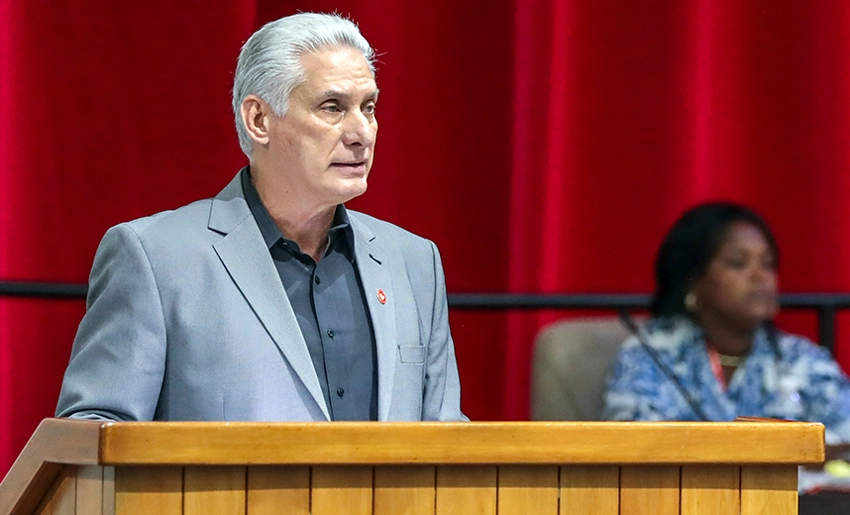Miguel Díaz-Canel Bermúdez, First Secretary of the Central Committee of the Communist Party of Cuba (PCC) and President of the Republic, reaffirmed the heroic resilience of the Cuban people this Friday at the close of the Fifth Ordinary Session of the National Assembly of People’s Power (Parliament).
From the Havana Convention Center, and in the presence of Army General Raúl Castro Ruz, leader of the Revolution, the President said that these sessions of Parliament became a true assembly of the people, because their debates reflected those of Cuban society today regarding the enormous challenges ahead.
The president expressed his deepest gratitude to the people for their resilience in the face of so many difficulties, their inexhaustible creativity, and their never giving up when everything is lacking, sometimes even the essential communication that we are obligated to provide.
In less than a month, the beginning of the Centennial of Commander-in-Chief Fidel Castro Ruz will be celebrated, to be commemorated in August 2026. He emphasized that the best tribute to the political and military genius, the educator, the scientist, the leader of just causes in Cuba and the world, is the work of the Cuban people.
He emphasized that what took place were critical, committed presentations, and, above all, concrete proposals and demands to change what needs to be changed, without delay.
The wisdom and enthusiasm that has characterized virtually all the speeches these days is what has been seen in the tours of the provinces, the First Secretary of the Party Central Committee emphasized.
He stated that the situation is tougher after the long hours of blackout; Cubans always find their strengths, and this is not the first time, nor will it be the last, that the Revolution faces its most difficult moment, although it will always seem that nothing can be worse than what it has faced.
Díaz-Canel recalled significant episodes in Cuba’s history, such as the Pact of Zanjón, the fall in combat of Martí and Maceo, the Yankee intervention, Mella’s anti-imperialism, the 1930 Revolution, the Machado regime, and the Antonio Guiteras massacre at El Morrillo, among other iconic events.
When one reviews all the periods of the Revolution’s 66 years in power, what one finds, in addition to victories, are Third World challenges, enemy setbacks, and also their own mistakes and lessons learned, all fruit of the never-abandoned desire to achieve and sustain social justice, he affirmed.
If, despite all this, the Cuban Revolution is standing and fighting for the prosperity it can achieve, it is because of its authentic and genuine character, he said.
“We are not an accident of history. We are the logical consequence of a history of resistance and rebellion against abuse and injustice, which has very profound reasons to believe in its strength,” the dignitary asserted.
He recalled that the persistence of the Revolution is not a historical accident, because the process that finally took power in 1959 was initiated by a small group of revolutionaries, but was carried out by an entire people, and they have defended it as a country of bravery.
“We learned that only by having clear convictions as principles is it possible to sustain and win battles, and we also learned that we can overcome siege by fighting,” he asserted.
The Cuban president recounted the three days of Assembly sessions, referring to the government’s program to correct distortions and boost the economy, the progress of the Cuban economy and budget execution, and the four laws passed.
Díaz-Canel dedicated minutes of his speech to reflecting on “the need to focus on vital areas for development, such as increasing the inflow of foreign currency, amid a very hostile environment in which the United States government strengthens its siege to increasingly prevent the entry of a single cent into the country.”
He also called for “focusing on all export capacities, which inevitably stem from an increase in production in all possible sectors, to do so in a manner sufficient in quantity and quality, allowing us to prevail over this siege and global competition.”
In his speech, the Head of State considered that “it depends on us, and only on us,” to be sufficiently efficient, even in the difficult circumstances of acting with hands tied by the blockade that some seek to circumvent. “It is a challenging challenge, but not impossible,” he asserted.
The Cuban President also referred to the four laws approved during this Ordinary Session of the National Assembly of People’s Power, which will strengthen the country’s institutional order and play a decisive role in the nation’s economic and social spheres: “On the Cuban Sports System”; “On the General Regime of Contraventions and Administrative Sanctions”; “On the Civil Registry,” and “one that stands out among all and reveals to us in all its beauty the importance of what we do as legislators: the Code of Children, Adolescents, and Youth.”
A few days before the 72nd anniversary of the assault on the Moncada and Carlos Manuel de Céspedes barracks, he congratulated the province of Ciego de Ávila, the host of the central event commemorating the anniversary, and the Cuban people, for whom surrender has been no alternative.
At the end of the speech, Díaz-Canel and Raúl exchanged cheers for the Revolution and Fidel, whose centenary all Cubans will commemorate in 2026.
With information from CNA
- Installation of Photovoltaic Systems in Rural Communities in Holguin - 19 de January de 2026
- 39th City Salon Opens in Holguin - 19 de January de 2026
- Habanos Festival Among Cuba’s Most Important Tourism Events - 19 de January de 2026

